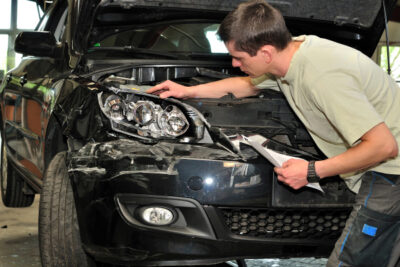
After a car accident, learning your vehicle is a “total loss” can feel overwhelming. How to determine the value of a total loss claim is key when dealing with insurance companies that may not offer fair payment. Your car insurance company might declare your car totaled when repair costs exceed the vehicle’s value. Understanding this process helps you get the money you deserve.
At Good Guys Injury Law, we fight for Utah accident victims with total loss claims. We know insurance companies often undervalue totaled vehicles. This leaves you stuck with too little money to replace your car. Let us help you get the fair market value you deserve for your damaged vehicle.
Table of Contents
Understanding Total Loss and Fair Market Value
When your car has major damage, your insurance company must decide to repair it or declare it a total loss. Most insurers consider a car totaled when repair costs exceed 70-80% of the vehicle’s pre-accident value. This is called the total loss threshold in Utah.
Fair market value is what your car was worth before the crash. Insurance companies use this figure to calculate your payout. Many victims don’t know that insurers often use tricks that lead to low valuations.
- Pre-accident condition
- Mileage
- Vehicle age
- Aftermarket parts
- Similar vehicles in your area
The gap between what an insurance company offers and your car’s actual value can be large. Insurance companies pay less than they should for many total loss claims.
What Does “Declared a Total Loss” Mean?
When your car is declared a total loss, it means your insurance company has decided that fixing your vehicle costs too much. In Utah, insurers use a total loss formula. They compare repair costs plus salvage value against the pre-accident market value.
Utah state regulations guide how insurers decide when a car is totaled. The total loss formula helps determine if your vehicle should be repaired or declared a total loss. When repair costs exceed a certain percentage of your car’s value, the insurance company will total it.
How Insurance Companies Define Fair Market Value
Insurance companies determine fair market value by comparing your totaled car to similar vehicles for sale locally. They check the year, make, model, mileage, and pre-accident condition. What they don’t tell you is they often use outdated data or ignore things that would raise your car’s value.
You should always check Kelley Blue Book values or search local dealers to verify the fair market value. We’ve seen cases where insurance companies valued cars at 15-20% below their true market value. This costs accident victims thousands in lost compensation.
Actual Cash Value (ACV) vs. Replacement Cost
Actual cash value (ACV) is your car’s value after depreciation—what insurance companies pay for your totaled vehicle. This figure accounts for the car’s age, condition, and mileage before the accident. Your car’s ACV is what your insurer uses to calculate your payment.
Replacement cost is what you’d pay to buy a similar car today. This amount is almost always higher than ACV. This gap explains why many drivers feel cheated when settling total loss claims. Your vehicle’s ACV might not be enough to buy a new vehicle of the same quality.
The Claims Process for a Totaled Car

Filing a claim for a totaled car involves several key steps that affect your final payment. Working through this process carefully helps you get the most money possible.
When your car is badly damaged, quick action matters. Report the accident to your own insurance company right away. This starts the claims process and speeds up your payment. Most car insurance companies follow standard steps for total loss claims.
The claims process might feel complex while you’re dealing with the stress of losing your car. Many insurance adjusters use this stress to push low offers. Stay alert and question anything that seems unfair.
Step-by-Step Guide to Filing a Total Loss Claim
- Report the accident to your insurance company immediately
- Document the damage with photos from multiple angles
- Gather proof of your car’s pre-accident condition
- Meet with the insurance adjuster for inspection
- Review the valuation report carefully
- Compare their offer to independent sources like Kelley Blue Book
- Negotiate if the offer seems too low
During the inspection, provide all evidence of your vehicle’s value—maintenance records, recent repairs, and photos from before the accident. These records help prove your car’s pre-accident condition was better than the insurer might claim.
How Insurance Companies Calculate Total Loss Value
When your car is totaled, understanding how insurance companies set its value helps you get fair payment. Insurance adjusters use formulas that don’t always work in your favor. Knowing their methods helps you spot low offers.
The basic calculation starts with your vehicle’s actual cash value (ACV). This equals the fair market value minus depreciation plus salvage value. Insurers often add hidden deductions to their formulas. They might inflate the salvage value to justify a lower payout.
Many insurance companies also undervalue aftermarket parts in your vehicle. The insurance adjuster might not count these improvements in your settlement unless you fight for them. Always point out any upgrades or special features your car has.
The Formula Used by Car Insurance Companies
Car insurance companies use math formulas to decide if your car is a total loss. They weigh your car’s pre-accident market value against repair costs and salvage value.
If your car’s market value is $15,000 with $12,000 in damage, and its salvage value is $3,000, the insurer will likely declare it a total loss. The repair costs plus salvage value ($15,000) equal the car’s worth. In this case, they’ll pay you the market value minus your deductible instead of fixing it.
Factors That Affect Your Vehicle’s Valuation
Several key factors influence how much your insurance company offers for your totaled car:
- Mileage – lower readings mean higher value
- Pre-accident condition – good maintenance records help
- Accident history – fewer prior accidents means better value
- Aftermarket parts – custom wheels and stereo systems add value
- Vehicle age – newer cars retain more value
Your car’s pre-accident market value is based on these factors. Keep all maintenance records and receipts for upgrades. These documents strengthen your claim and help prove your car’s true worth.
How Auto Insurance Companies Pay for Total Loss Claims

Once your vehicle is declared a total loss, knowing how insurance companies handle payments helps you plan the next steps. Most insurers process payouts within 2-4 weeks after approving a claim. The time varies by company and case.
Payment issues often arise with leased or financed vehicles. If you still owe money on your car, the insurance company pays your lender first. You only get the remaining funds after your loan is paid off. Sometimes, this leaves you with nothing.
The payment process can be frustrating when there’s a gap between what you owe and what insurance pays. Gap insurance covers this difference. Without it, you might end up paying off a loan for a car you no longer have.
Will Insurance Companies Pay Fair Market Value?
Insurance companies rarely offer fair market value without a fight. First offers typically fall 10-20% below your car’s true worth. This tactic saves insurers millions yearly at the expense of accident victims.
To counter low offers, gather proof of your vehicle’s true value. Find listings for similar vehicles in your area. Present this evidence to your insurance adjuster and be ready to negotiate. Don’t take the first offer – it’s almost always too low.
Understanding Deductibles and Payouts
Your deductible directly impacts your total loss payout. This amount—which you chose when buying your policy—is subtracted from your settlement. If your car’s value is $15,000 and your deductible is $1,000, you’ll receive $14,000.
Insurance companies apply the deductible in most cases. Even if another driver caused the accident, you’ll still pay your deductible when filing through your insurance. You may get this money back later if the other driver is at fault.
Different coverage types have different deductibles. Collision coverage handles most total loss claims from accidents. Comprehensive coverage (for theft or weather damage) might have a different deductible amount.
Disputing the Insurance Company’s Valuation
When your insurance company’s offer is too low, you have options to fight for fair payment. Most drivers don’t know that settlements are negotiable. With the right approach, you can often get more money.
Start by gathering proof of your vehicle’s true value. Search for comparable vehicles currently for sale in your area. Focus on the same year, make, model, and similar mileage. Print these listings as evidence of your car’s worth.
If the insurer won’t budge, consider hiring an independent appraiser. For about $300-$500, a professional can provide an unbiased valuation. This cost often pays for itself with a higher settlement. As a last resort, you can file a complaint with the Utah Department of Insurance.
Aftermarket Parts and Their Impact on Value
Aftermarket upgrades can boost your car’s value, but insurance companies often ignore them. From custom wheels to premium sound systems, these investments should be part of your total loss settlement.
Insurance adjusters typically focus on factory features when valuing your vehicle. Unless you point out aftermarket improvements, they’ll likely overlook them. This oversight can cost you hundreds of dollars in your final payout.
Always keep receipts for parts, upgrades, and custom work. These documents prove the value that insurers can’t easily dismiss. Photos of these upgrades also strengthen your case, especially for visible improvements like wheels or body modifications.
Contact Good Guys Injury Law for a Free Claim Review

Don’t let insurance companies undervalue your totaled car. At Good Guys Injury Law, we understand the tactics insurers use to minimize payouts on total loss claims. Our team of Utah personal injury attorneys has helped many accident victims get fair payment for their damaged vehicles.
We offer free claim reviews to help you understand your options. Before you accept any settlement offer for your totaled car, call us or fill out our contact form. We’ll evaluate your case and explain how we can help maximize your recovery at no upfront cost to you.






